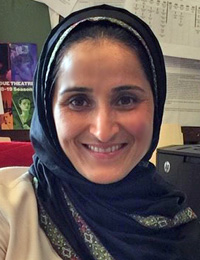May 1, 2020:
Since 1978, the Purdue University Center for Cancer Research has been a National Cancer Institute-designated basic research cancer center. Only seven institutions in the United States have earned this title. Being a basic research center means we don’t treat cancer patients directly. Our work focuses on investigating cancers where they begin — at the cellular level — to investigate the cause of and cure for one of the most devastating diseases of our time.
Doctors and scientists throughout the world use our discoveries to develop methods, medicines, and medical devices to save and enhance patients’ lives.
Learn more at: https://www.purdue.edu/cancer-research/.
Investigator Spotlight
Humaira Gowher, PhD, Purdue University Center for Cancer Research
Educational background
- PhD in Biochemistry: Justus Leibeg University, Germany
- MSc in Biochemistry: Aligarh Muslim University, India
Research interests
The overarching goal of our research is to elucidate epigenetic mechanisms that control cell identity and determine how these mechanisms are disrupted in cancer. Using embryonic stem cells and embryonal carcinoma cells as model systems, our research specifically focuses on the activity of distal regulatory elements of developmental genes, called enhancers, and insulators. We also study the effect of somatic mutations of DNA and histone methyltransferases commonly found in cancer and other developmental disorders on the biochemical activity of these enzymes.
Personal Interests
- Social activities associated with Islamic Society of Greater Lafayette.
- Political advocacy for human rights and freedom of the people of Kashmir.
- Gardening, cooking, and riding my bike whenever I can.
Want to read more about Dr. Humaira? Read this article: Meet this Kashmiri scientist who is making Kashmir proud worldwide.
About the Big Ten Cancer Research Consortium: The Big Ten Cancer Research Consortium was created in 2013 to transform the conduct of cancer research through collaborative, hypothesis-driven, highly translational oncology trials that leverage the scientific and clinical expertise of Big Ten universities. The goal of the Big Ten Cancer Research Consortium is to create a unique team-research culture to drive science rapidly from ideas to new approaches to cancer treatment. Within this innovative environment, today’s research leaders collaborate with and mentor the research leaders of tomorrow with the unified goal of improving the lives of all patients with cancer.
About the Big Ten Conference: The Big Ten Conference is an association of world-class universities whose member institutions share a common mission of research, graduate, professional and undergraduate teaching and public service. Founded in 1896, the Big Ten has sustained a comprehensive set of shared practices and policies that enforce the priority of academics in the lives of students competing in intercollegiate athletics and emphasize the values of integrity, fairness and competitiveness. The broad-based programs of the 14 Big Ten institutions will provide over $200 million in direct financial support to more than 9,800 students for more than 11,000 participation opportunities on 350 teams in 42 different sports. The Big Ten sponsors 28 official conference sports, 14 for men and 14 for women, including the addition of men’s ice hockey and men’s and women’s lacrosse since 2013. For more information, visit www.bigten.org.














Subscribe to the Big Ten CRC Newsletter X
X Facebook
Facebook YouTube
YouTube